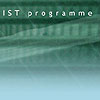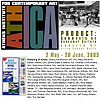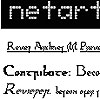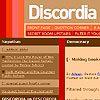 Originally
published
on
06/24/03
Originally
published
on
06/24/03"ALTERNE" (Alternative Realities in Networked Environments) consortium is making a call for outlines of artistic projects. "The chosen projects will acquire access to new tools, interfaces, SW and technologies related to qualitative physics, virtual storytelling, AI technology, implementation of alternative principles of causality and new visualization techniques for immersive CAVE-like environments." The consortium researches and develops works funded by the European Commission and endevours to promote collaborations between new-media artists and laboratories. For further specifications on the project outline format please see the website.
:: Garrett Lynch ::
 Originaly
published
on
06/23/03
"ATHICA,
Athens
Institute
of
Contemporary
Art"
is
making
a
call
for
entries
for
web-specific
projects
to
be
featured
in
their
Virtual
Art
Gallery
from
August
7th
2003.
Originaly
published
on
06/23/03
"ATHICA,
Athens
Institute
of
Contemporary
Art"
is
making
a
call
for
entries
for
web-specific
projects
to
be
featured
in
their
Virtual
Art
Gallery
from
August
7th
2003."Conceived of as an 'alternative art space', the Athens Institute for Contemporary Art (ATHICA), is dedicated to exhibiting challenging, provocative and innovative contemporary art in a non-traditional setting, solely for the cultural enrichment of the Northeast Georgia community."
For further information please see the website.
:: Garrett Lynch ::
 Originally
published
on
06/23/03
Originally
published
on
06/23/03Alternative ways for viewing web pages have been part of net culture since the beginning of the web. Rhizome houses some well-known browsing interfaces such as Spiral, Starry Night, Ada 1852, Context Breeder, and Troika--all exclusively providing access to the Rhizome database. Other interfaces such as The Boxplorer by Andy Deck, Goodworld by Lew Baldwin, and Revelation1.0 by Mark Tribe focus on reformatting web pages into Mondrian-like abstractions.
And then came Epic Tales by Carlo Zanni, which reformats web pages not into allegorical modern compositions but, instead, leaves the layout intact and reinterprets the text into a combination of Modern English and 'Anglo-Saxon of an ancient warrior culture' text-types. The result is disconcerting layouts. Unlike the alternative interfaces previously described, Epic Tales lets the user reevaluate the actual content in relation to a particular history that is not immediately connected to net technology. The reasons behind this rhetorical strategy become evident when reading the project description, where Borges' addiction to studying languages to find his cultural roots is cited as an inspiration. Borges states:
Each
one
of
the
words
stood
out
as
though
it
had
been
carved,
as
though
it
were
a
talisman.
For
that
reason
the
poems
of
a
foreign
language
have
a
prestige
they
do
not
enjoy
in
their
own
language,
for
one
hears,
one
sees,
each
one
of
the
words
individually.
We
think
of
the
beauty,
of
the
power,
or
simply
of
the
strangeness.
And this is not far from the feeling one may get when viewing a favorite website as an 'epic tale' interpretation. One needs to be patient with this piece, but it is worth the wait -- especially when going back to Anglo-Saxon Times. However, it should be noted that the artist contextualizes the piece as a way to expose militaristic tendencies running through contemporary media. A dark side eventually unfolds as one views the website.
This piece is officially being launched on June 25 as a CCA:
:: Eduardo Navas ::
 Originally
published
on
06/19/03
Originally
published
on
06/19/03Finally, I am glad to announce a resource that is sure to prove essential to the net art community. Discordia.us is now officially open for dissemination, providing a new way of communication where users submit stories which can then be voted on. The stories with the most votes are then presented on the splash page.
Discordia.us is an ambitious experiment at decentralized self-publishing. ÊSo, log-on; read-on; and, most importantly, vote on ideas that you deem important. This new approach to communication is sure to affect the dynamics of mailing lists.
:: Eduardo Navas ::